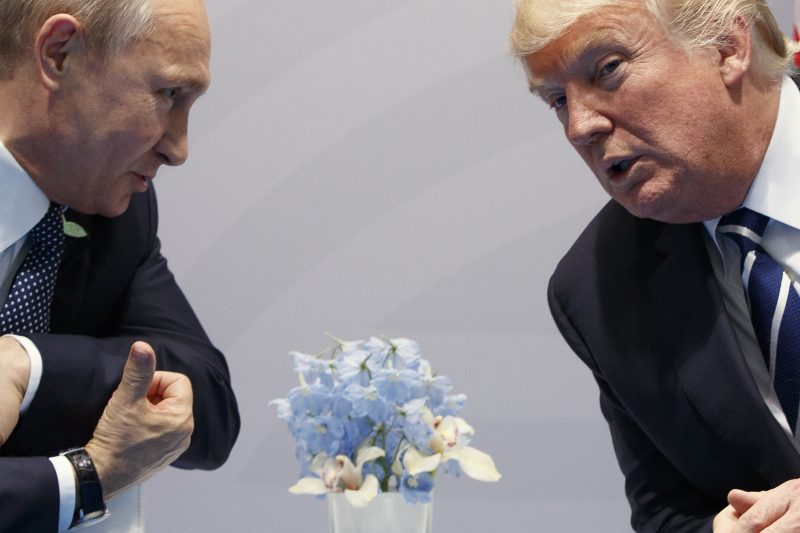The American political right’s complicated internal debate over Russia and Vladimir Putin is coming to a head.
Even as congressional Republicans this week were threatening to cut off Ukraine aid once and for all, former president Donald Trump floated the idea that he would encourage Putin to attack NATO countries that didn’t pay enough; Tucker Carlson set about what was effectively a pro-Russian propaganda tour in which he downplayed Putin’s killing of political opponents; and then top Putin opposition leader Alexei Navalny was reported dead in prison.
The confluence of events has suddenly led to some stark comments from the more anti-Putin wing of the Republican Party, which set about deriding any Putin apologists and Russian propagandists in their midst.
Sen. Thom Tillis (R-N.C.) called Carlson Russia’s “useful idiot.” After Navalny’s death, he added: “History will not be kind to those in America who make apologies for Putin and praise Russian autocracy. Nor will history be kind to America’s leaders who stay silent because they fear backlash from online pundits.”Sen. John Cornyn (R-Tex.) urged fellow Republican and Texas Attorney General Ken Paxton to “spend less time pushing Russian propaganda.”A top political aide to Sen. Todd Young (R-Ind.) promoted Young’s denunciation of Navalny’s death by saying, “My U.S. Senator is not a venal Putin apologist, but I’m less sure about yours.”Presidential candidate Nikki Haley said Navalny was killed by the “same Putin who Donald Trump praises and defends.” Haley soon noted that, while Trump weighed in repeatedly on NATO this week and posted dozens of times on Truth Social on Friday, he hasn’t yet mentioned Navalny.Former Trump vice president Mike Pence posted, more generally, “There is no room in the Republican Party for apologists for Putin.”
Despite Pence’s contention, the events this week showed that’s not really the case with the broader right. In addition to Carlson’s comments about Putin’s killing opponents, former congressman Lee Zeldin (R-N.Y.) and conservative influencers quickly likened Navalny’s death to Trump’s criminal charges. Trump himself has frequently echoed Carlson’s reluctance to cast judgment on Putin, and his lack of comment Friday has been conspicuous — to say the least.
The thing about the Republican Party is that it’s not so much that it likes Putin or even thinks he’s an okay guy. Polling last year showed fewer than 1 in 10 Republicans had a favorable view of Putin or trusted him to do the right thing on the world stage, and Republicans said 76 percent to 16 percent that Putin is a war criminal. These are not in line with Carlson’s professed worldview.
But a significant and influential segment of the party has demonstrated a tendency toward a brand of moral relativism and even authoritarianism that creates an opening for giving Putin a pass.
A number I keep coming back to: Shortly after it was revealed in late 2016 that Russia interfered in the 2016 election to help Trump, an Economist/YouGov poll showed a sharp increase in favorable GOP views of Putin. Suddenly, 37 percent had a favorable view, and 47 percent had an unfavorable one. Just 14 percent had a “very” unfavorable view of him.
Early 2017 Gallup data echoed this. It showed 32 percent of Republicans suddenly liked the man who had just interfered in an American election.
As you can see from the above chart, the honeymoon didn’t last. Putin just as quickly fell out of favor even on the right. He then became a pariah in both parties after he invaded Ukraine in early 2022, ranking among the most disliked foreign figures in modern U.S. political history.
That remains the case.
But if anything, it suggested that much of the GOP’s views of Putin were malleable. Whether nearly 4 in 10 Republicans briefly liked him because they believed he had done Trump a solid or because of negative partisanship (“Democrats are attacking Putin and suggesting Trump’s election was illegitimate because of Putin,” the thinking might go), there was some real softness in its anti-Putin character.
Another poll I keep coming back to comes from Vanderbilt University last year. Even a year into Putin’s invasion of Ukraine, it showed a majority of MAGA Republicans (52 percent) said Putin was a better president than Joe Biden.
Maybe these Republicans just disliked Biden that much, or maybe they saw something admirable in Putin’s strongman mystique (a sentiment Trump has spent years cultivating). It certainly wouldn’t be the only evidence of Trump supporters flirting with the merits of authoritarianism.
Regardless, the data show how, when these loud voices on the right project softness on Putin or his invasion of Ukraine, there’s a willingness to hear that out — even if the base doesn’t actually like Putin. Influential voices on the right have spent years creating a permission structure for shrugging at things like Navalny’s death (see: Jamal Khashoggi). And there’s been little in the way of a desire to fight back against these noisy and influential forces — in part because that would entail going against the most powerful Republican and the onetime most influential conservative commentator.
Republican Russia hawks have increasingly lost the will to fight those battles, as their response to Trump’s NATO comments demonstrated just a few short days ago. We’ll see whether events from later in the week — and the very real threat of Ukraine being cut off — change that.

